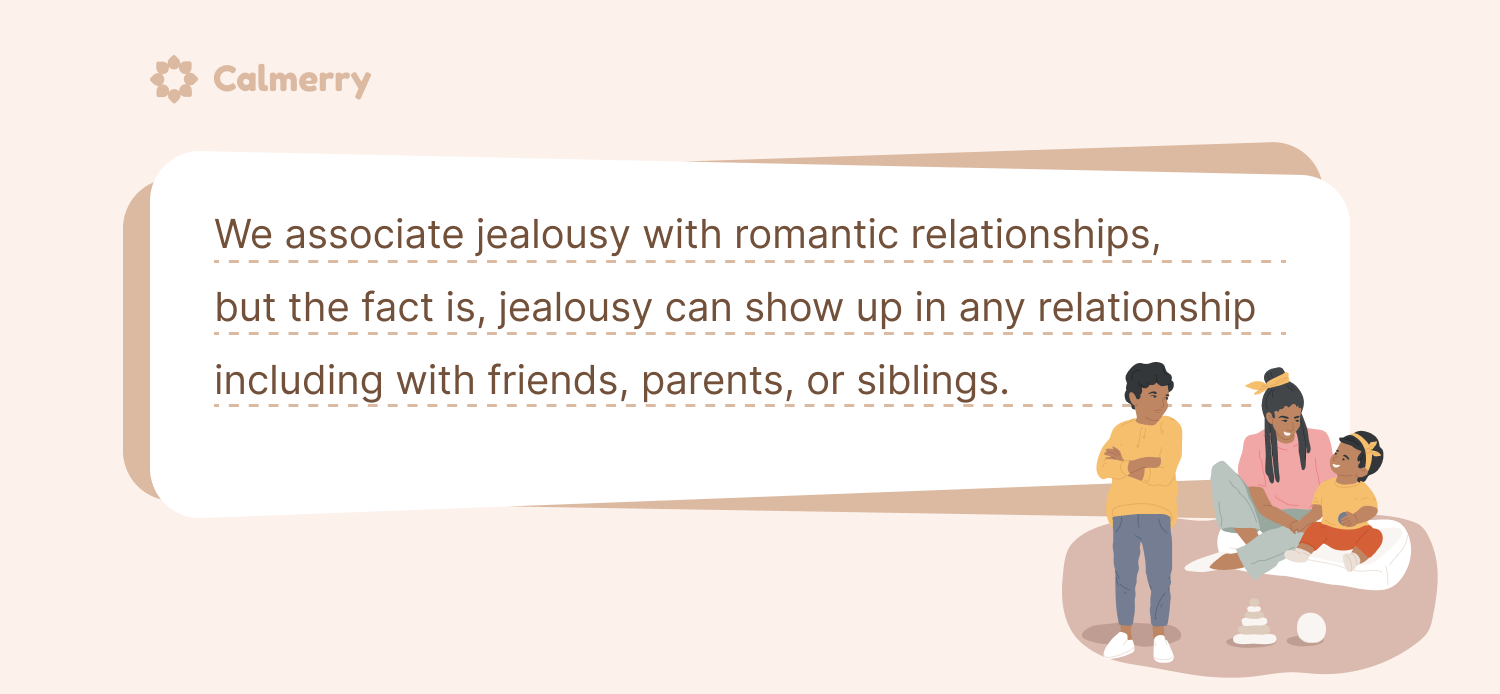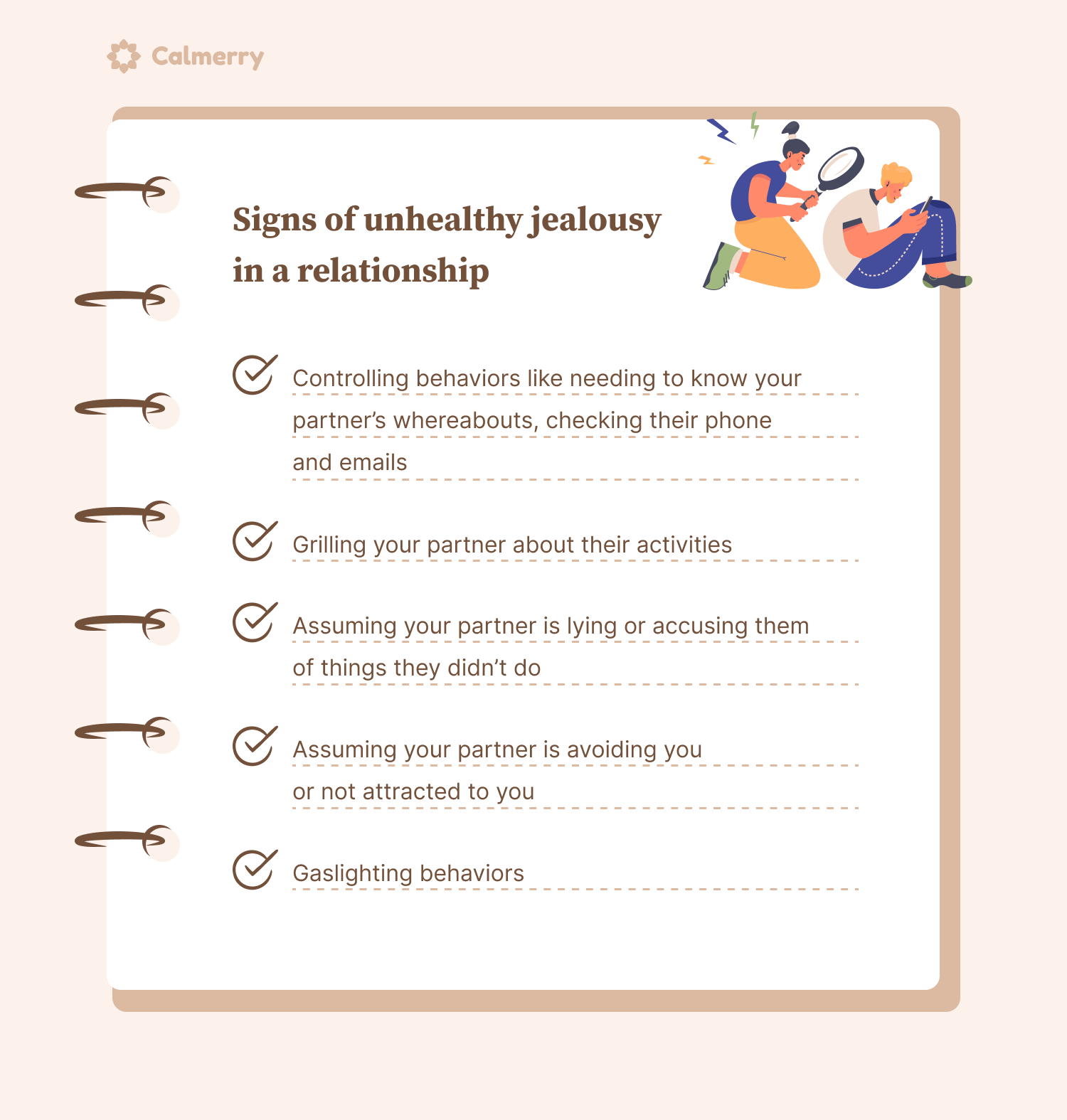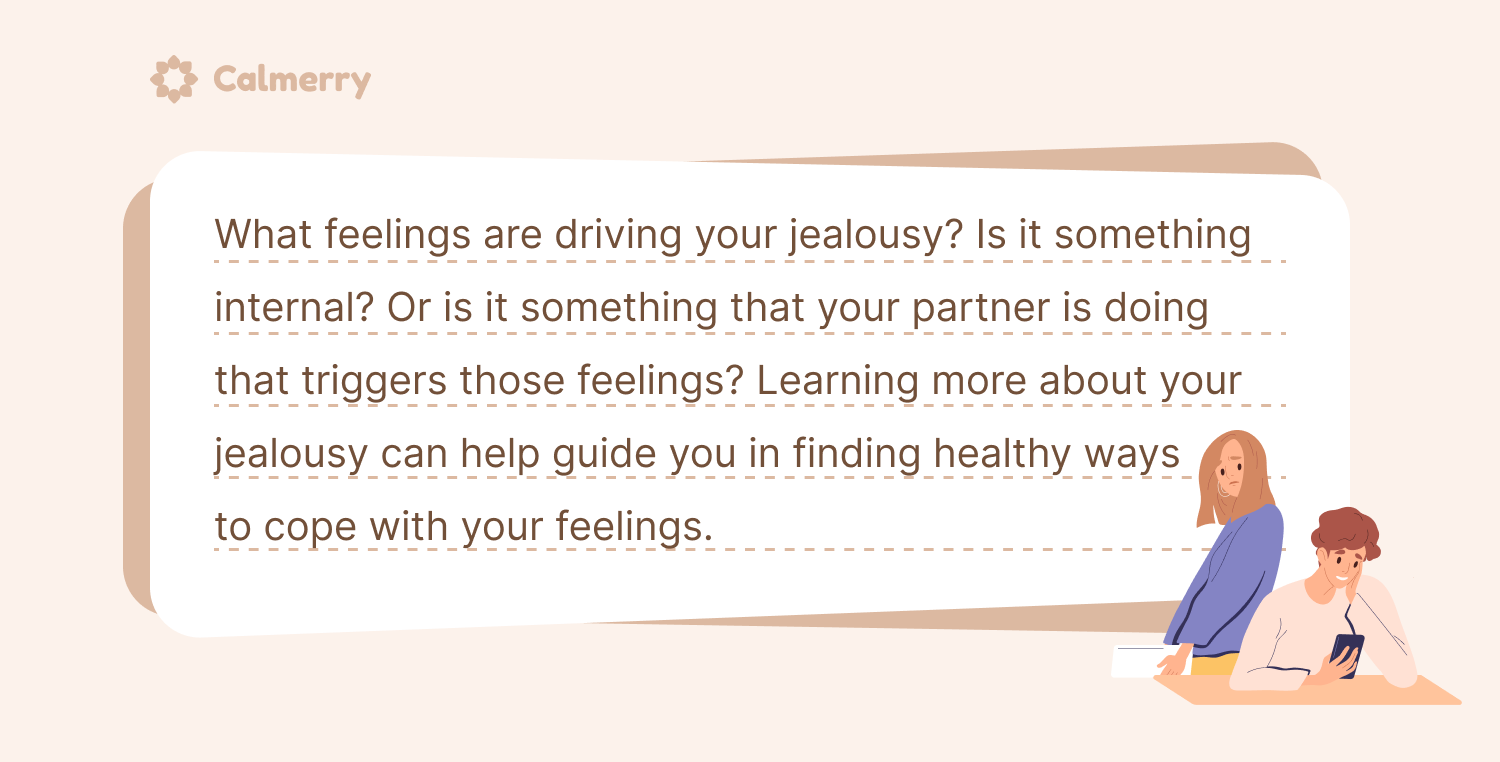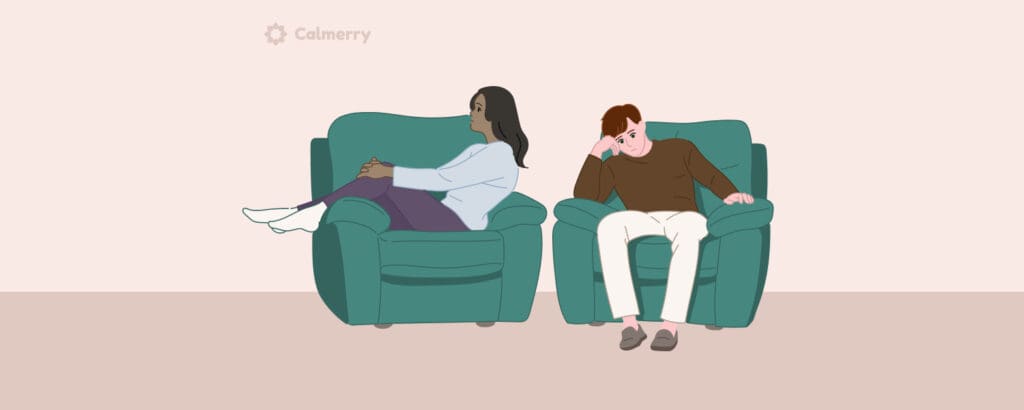Is Jealousy Ever Healthy in a Relationship?

In this article
If you’ve ever battled the Green-eyed Monster, you might be thinking, “What kind of question is that? Of course, it’s not!”
When you think of jealousy, you probably think of envy, trying to manipulate or control someone, snooping, checking up, accusations, and even angry outbursts. Jealousy can also be much more subtle and actually be useful, in a good way. Wait, what?!
It might surprise you that some research suggests that there is some degree of jealousy in almost every relationship and that it can actually be a good thing. But there’s a fine line between healthy and unhealthy jealousy.
So, what does “jealous” mean? When is it healthy, and when can it spell trouble? What can you do if unhealthy jealousy has invaded your relationship? You’ve got questions. We’ve got answers!
What is jealousy exactly?
Jealousy is an emotion that emerges when one person perceives another person as taking (or is likely to take away) a loved one’s attention or affection. The key element of jealousy is that it operates within a relationship triangle – the jealous person, the partner (or desired partner), and the person who is perceived as the potential threat.
We associate jealousy with romantic relationships, but the fact is, jealousy can show up in any relationship, including with friends, parents, or siblings.

Jealousy vs. envy
Jealousy is often mistaken for its close cousin, envy. Envy is a negative emotion driven by the desire to possess what another person has. It’s like feeling resentful when your co-worker lands the dream job you’ve desired your whole career.
Envy is similar to jealousy, and they are often used interchangeably, but they differ in one important way: envy involves two people. Jealousy is a threesome.
Why do I get jealous so easily?
You don’t want to lose someone important to you. But what causes jealousy in a relationship is more than just a perceived threat. It goes deeper than that, and it’s not about the love you have for each other. Jealousy has its roots in your own vulnerability and insecurities rather than in your partner’s actions.
Some of the root causes of jealousy include:
- Low self-esteem
- Neuroticism (i.e., the tendency to be moody or anxious)
- A sense of possessiveness towards a partner
- Codependency
- Lack of trust
- A need for approval
Attachment styles, how we connect and engage with others, play a big role in how secure we feel in relationships. Attachment styles are formed very early in life by the relationships we have with our caregivers, usually parents. Early separation, trauma, neglect, or other adverse experience influences our ability to form secure, healthy attachments later in life.
Studies have found that people with anxious attachment styles are more prone to jealousy than those with more secure attachment styles. Anxious attachment can create a fear that your partner will leave you or won’t love you enough.
Evolutionary psychology suggests that jealousy is a natural, adaptive process that developed to help preserve important relationships. Jealousy developed as a way to help protect partners from the attention of others. Jealousy has even been linked to the “love hormone” oxytocin, further supporting the idea that we are actually hard-wired to experience jealousy.
So, if jealousy is a natural, evolutionary response, how is jealousy healthy in a relationship when it can be so destructive? The difference seems to be in the type of jealousy, and now it is expressed.
Healthy vs. unhealthy jealousy
Most people will experience a twinge of jealousy now and then, even in healthy relationships. For some, that twinge becomes a pattern and a problem. Behavior becomes controlling and even toxic. This is a type of jealousy known as suspicious jealousy. It’s the jealousy that you think of when you hear the word: being suspicious and mistrustful, snooping, or accusing your partner of something. Suspicious jealousy is largely a reflection of one’s inner struggles with things like low self-esteem or insecurities.
Some of the signs of unhealthy jealousy in a relationship can include:
- Controlling behaviors like needing to know your partner’s whereabouts, checking their phone and emails
- Grilling your partner about their activities
- Assuming your partner is lying or accusing them of things they didn’t do
- Assuming your partner is avoiding you or not attracted to you
- Gaslighting behaviors

Left unchecked, jealousy can undermine emotional safety and create toxic relationships. Sometimes, jealousy can become extreme and even dangerous for the person and their partner. It’s a form of jealousy known as pathological jealousy. This type of jealousy is driven by the need to own or control and goes well beyond what would be considered “normal” jealousy and requires intervention.
Of course, most jealousy won’t rise to that level. Still, jealousy can take its toll on a relationship. Subjected to jealous behaviors, a partner may pull away or even avoid interactions. This can lead to their suppressing emotions, stifling communication, resentment, and even a divorce or breakup.
So, if jealousy can be so destructive, how can it ever be healthy? When is it OK to be jealous in a relationship?
Research suggests that there is another side to jealousy that can actually be helpful in relationships. This healthy jealousy, sometimes referred to as reactive jealousy by evolutionary psychologists, is the type of jealousy that can help to protect a relationship. Jealousy in this context may be indicative of a partner who values their relationship and is willing to express their feelings and needs.
Research has found that this healthy type of jealousy is linked to healthy relationships:
- Stronger feelings of being in love with your partner
- Feeling more love for your partner
- More stability and satisfaction in the relationship
How to express jealousy in a healthy way
Expressing jealousy in a healthy way means expressing your feelings honestly and calmly also being sensitive to your partner’s feelings, and respecting boundaries.
Healthy ways to express jealousy include:
Reflect on what’s really happening
Take some time to understand what you’re feeling and why. A trusted friend, therapist, or seeking online relationship counseling can be helpful here, providing valuable insights and guidance for emotional clarity and personal growth.
Think before you speak
Conversations when emotions are running high never end well. Take time to think about what you want to say. Write it down or practice if that helps you to stay grounded and focused. Deep breathing can help you center and focus.
Share your feelings
You want your partner to hear you. It’s easy to get heated and defensive when feelings are involved. Once something unkind is said, you can’t take it back. Then no one is listening. Avoid using blaming, shaming, or accusatory language. Instead, help your partner understand your feelings.
For example, instead of using “You-statements”, try using “I-statements”. It’s a subtle but important way to keep the focus on your experience and help your partner understand.
Here’s an example:
“You make me feel so jealous when you spend all your time doing ___.” Chances are, your partner will jump into defense mode. Conversation over.
Instead, try this: “I feel jealous when you _____. I’d like to talk about that with you.” Your partner is much more likely to respond with interest and be open to conversation.
Practice patience
You’ll probably not resolve things in one conversation. Working through strong feelings often takes several conversations to come to some resolution. Give each other space and time to work through your feelings.
There is definitely a fine line between the healthy and unhealthy expression of jealousy. What can you do if you find that jealousy is creating problems in your relationship?
Taming the green-eyed monster
Left unchecked, jealousy can destroy a relationship. You can do something about it. Changing behavior isn’t always easy but there are ways to overcome jealousy in a relationship and keep your green-eyed monster in check.
Learn about jealousy
You can’t change something you don’t recognize. Jealousy is what is on the surface. What feelings are driving your jealousy? Is it something internal? Or is it something that your partner is doing that triggers those feelings? Learning more about your jealousy can help guide you in finding healthy ways to cope with your feelings.

Understand your insecurities
It’s important to get to know your insecurities and understand where they come from and how they shape your behavior. As you do, you can start to explore healthy ways to feel more secure in your life. That probably sounds like a tall order. Where do you start?
Journaling is a great way to explore different aspects of yourself, your feelings, and your emotional needs. A therapist can also help you to uncover the source of your jealousy and ways to manage it.
Talk with your partner
Share your feelings and concerns with your partner. Opening up about your experience can help them to understand what you’re feeling. It may also help them to make changes if that needs to happen to help you feel more secure. Some couples really struggle with these conversations. Relationship counseling helps couples work through issues and build stronger, healthy relationships.
Be kind to yourself
It’s easy to judge behavior as “good” or “bad,” and we can be our own harshest critics. In fact, behavior serves a purpose. Jealousy is an indicator that something needs your attention. It might be something that has triggered an unhealed emotional wound. It might be a signal that something in your relationship is veering off course. Whatever it is, give yourself compassion and grace as you work on the issues.
Practice gratitude
Gratitude is more than just being grateful. Gratitude is more about being aware of and appreciative of the positive things in your life. Practicing gratitude can help to reduce unpleasant feelings and improve your sense of well-being. Gratitude has also been linked to healthier and more satisfying relationships. One easy way to practice gratitude is to use a gratitude journal or simply take a moment each day to write down a few things that you are grateful for.
Take a time out
When you’re in the moment, jealousy can feel intense and even overwhelming. Take a break. When you can turn your attention to something else, it gives the intensity of the emotion time to dissipate and may prevent you from acting on it. Take a walk. Journal. Do something soothing. This strategy won’t help you to work through issues, but it can help to give you a break from those intense feelings.
Talk to a therapist
Jealousy is complicated. It can be disruptive, and it can be painful. Sometimes it’s just bigger than what you can or want to manage on your own. That’s ok.
You don’t have to deal with jealousy alone. Seeing a therapist offers you a safe space to explore your issues and needs without judgment. A therapist can help you understand the roots of your jealousy and your emotional needs and learn healthy coping skills.
You may decide to go to therapy on your own. You may decide to go as a couple if your jealousy is creating problems in the relationship.
The takeaway
Jealousy can be hard on a relationship. If you find that your jealousy is creating problems with your partner, there are things you can do to overcome your jealous feelings.
Building strong relationships takes work and commitment to the things that create strong, healthy emotional bonds. How healthy is your relationship? Take the Relationship Test here to find out.
Today, finding therapy is easier than ever. Online therapy makes seeing a therapist convenient and comfortable. With online therapy, you can see your therapist from the comfort of your home and at times that work with your busy schedule. If you’re choosing relationship counseling, online therapy can make scheduling easy for both of you. Best of all, online therapy has been shown to be at least as effective as traditional in-person therapy. You can take control of your jealousy and have the healthy, satisfying relationship you want. Calmerry can help you get there.
online therapy
live video session



